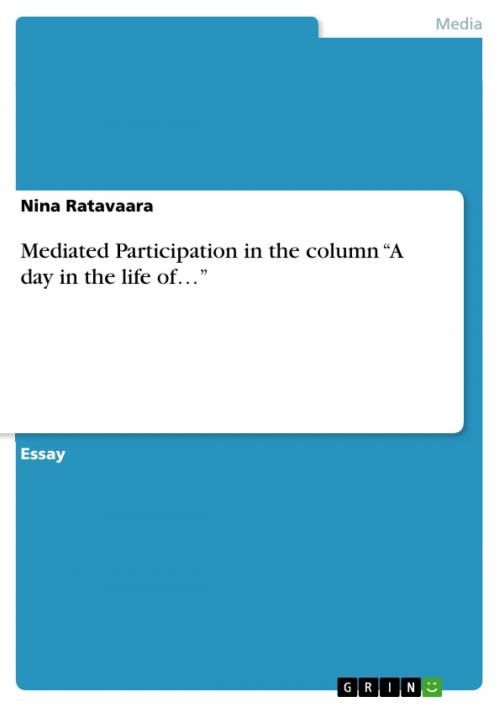Mediated Participation in the column 'A day in the life of...'
Nonfiction, Computers, Application Software, Multimedia| Author: | Nina Ratavaara | ISBN: | 9783656012221 |
| Publisher: | GRIN Verlag | Publication: | September 21, 2011 |
| Imprint: | GRIN Verlag | Language: | English |
| Author: | Nina Ratavaara |
| ISBN: | 9783656012221 |
| Publisher: | GRIN Verlag |
| Publication: | September 21, 2011 |
| Imprint: | GRIN Verlag |
| Language: | English |
Essay from the year 2009 in the subject Communications - Multimedia, Internet, New Technologies, grade: 3 (vgl. Anm.), University of Helsinki (Communications), course: Mediated Participations, language: English, abstract: This essay combines theory of power relations and identity construction in mediated participations with a case study. The two theoretical aspects are essential to consider when talking about participation in media because there are different definitions, grades, and perspectives on participation. What might seem like full participation might be restricted and controlled more than is visible to the first glance. On the other hand there might be signs and hints of resistance and usage of the participation platform for one's own benefit, e.g. by constructing a favourable identity. Both old and 'new'(mass) media play an important role in society and with the rise of the so called 'new media' interaction, interactivity, and participation of consumers, 'ordinary' people, and citizens have become approaches both in business strategies as well as in democratization enhancement visions. In this essay the term 'participation' carries a political connotation following Mouffe's description which defines the 'political as a domain of the social, which can emerge in a wide range of social relations [...] Moving into the world of trans-politics, this wide range of social relations would arguably include both mediated social relations and social relations within the media system itself.' (quoted in Carpentier 2009b, pp. 4) There exists participation in and through media. The important characteristics of participation through media are the allowance for participation in public debates and self-representation in the public sphere. (Carpentier 2009b, pp. 4) Participation in media addresses the production of media output by non-professionals. There are fewer examples of mainstream media allowing for this kind of participation than alternative media. In the small number of examples an in-depth examination and evaluation of the power relations and existing imbalances needs to be done by the media professionals. (Carpentier 2009b, pp. 4) The 'new' media also eclipsed the already existing participatory potential of the traditional media which leads to three capital errors. As already mentioned, the significance of the traditional media is not taken into account. But they still have a permanent place in the lives of many- be it because of tradition, lacking access to 'new' media or because those media types are still central players to create relevance.
Essay from the year 2009 in the subject Communications - Multimedia, Internet, New Technologies, grade: 3 (vgl. Anm.), University of Helsinki (Communications), course: Mediated Participations, language: English, abstract: This essay combines theory of power relations and identity construction in mediated participations with a case study. The two theoretical aspects are essential to consider when talking about participation in media because there are different definitions, grades, and perspectives on participation. What might seem like full participation might be restricted and controlled more than is visible to the first glance. On the other hand there might be signs and hints of resistance and usage of the participation platform for one's own benefit, e.g. by constructing a favourable identity. Both old and 'new'(mass) media play an important role in society and with the rise of the so called 'new media' interaction, interactivity, and participation of consumers, 'ordinary' people, and citizens have become approaches both in business strategies as well as in democratization enhancement visions. In this essay the term 'participation' carries a political connotation following Mouffe's description which defines the 'political as a domain of the social, which can emerge in a wide range of social relations [...] Moving into the world of trans-politics, this wide range of social relations would arguably include both mediated social relations and social relations within the media system itself.' (quoted in Carpentier 2009b, pp. 4) There exists participation in and through media. The important characteristics of participation through media are the allowance for participation in public debates and self-representation in the public sphere. (Carpentier 2009b, pp. 4) Participation in media addresses the production of media output by non-professionals. There are fewer examples of mainstream media allowing for this kind of participation than alternative media. In the small number of examples an in-depth examination and evaluation of the power relations and existing imbalances needs to be done by the media professionals. (Carpentier 2009b, pp. 4) The 'new' media also eclipsed the already existing participatory potential of the traditional media which leads to three capital errors. As already mentioned, the significance of the traditional media is not taken into account. But they still have a permanent place in the lives of many- be it because of tradition, lacking access to 'new' media or because those media types are still central players to create relevance.















